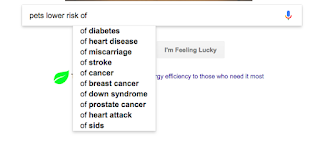Touch and Health
In the book The Deepest Sense, Classen writes that medieval Europeans believed strongly in the power of touch. The touch of a saint, according to their conception, could heal the sick. A witch’s touch could cause someone to become ill. While perhaps most of us no longer worry that a women who is sleeping with the devil is going to poison us, we certainly recognize the power of touch in new ways.
The discussion of touch and animals in The Deepest Sense reminded of something I had read about how pets lower children’s risk of developing asthma and allergies later in life. Being around something meant to be petted, it seems carries a whole host of health benefits. Just plug “pets lower the risk of…” into google and see the huge list of suggestions that pops up. Heart disease, Alzheimer’s, depression, asthma, cancer, stroke… the list is as endless as it is unbelievable. Apparently, our need to touch and be touched is so strong that our very lives can depend on it.
Living in such close proximity to other species animals completely by choice is something that humans are much more prone to than other species. There are other symbiotic relationships in nature, but these are often short-lived and rarely intentionally sought out. Humans, for some reason, actively seek out other species to live with. We love to feed them and we will pet almost anything. Perhaps natural selection has favored those with an instinct to find pets. We crave touch, and those who got pets were both healthier and happier. We evolved to pet animals. In a way, we did not domesticate them, but rather they domesticated us.
The connection between health and touch has come up several times in this class now. After reading this most recent book, I can’t help but think back to A Natural History of the Senses, which recounted how important touch is in helping premature babies start to thrive. Apparently, a person doesn’t have to be a saint to heal someone with a touch; all they have to do is volunteer at a NICU. This is just one of the cases in which the sense of touch can help us heal.
The discussion of touch and animals in The Deepest Sense reminded of something I had read about how pets lower children’s risk of developing asthma and allergies later in life. Being around something meant to be petted, it seems carries a whole host of health benefits. Just plug “pets lower the risk of…” into google and see the huge list of suggestions that pops up. Heart disease, Alzheimer’s, depression, asthma, cancer, stroke… the list is as endless as it is unbelievable. Apparently, our need to touch and be touched is so strong that our very lives can depend on it.
Living in such close proximity to other species animals completely by choice is something that humans are much more prone to than other species. There are other symbiotic relationships in nature, but these are often short-lived and rarely intentionally sought out. Humans, for some reason, actively seek out other species to live with. We love to feed them and we will pet almost anything. Perhaps natural selection has favored those with an instinct to find pets. We crave touch, and those who got pets were both healthier and happier. We evolved to pet animals. In a way, we did not domesticate them, but rather they domesticated us.



Comments
Post a Comment